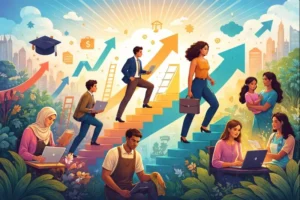The Impact of Deglobalization on Social Inequality: Unpacking the Hidden Costs of a Fragmented World
Deglobalization isn’t just a shift in trade policies—it’s a seismic change that reshapes how wealth, opportunity, and inequality are distributed across the globe.
As nations pull back from global integration, local economies face growing pressure to become self-reliant.
While that sounds empowering, it often benefits the well-connected and marginalizes vulnerable communities.
In low-income countries, deglobalization can mean fewer exports, job losses, and shrinking access to global markets.
Meanwhile, wealthy countries may tighten immigration, reinforcing economic walls that widen the inequality gap.
The ripple effect? Social mobility slows, and economic disparities harden.
Supply chains once linked across continents now shrink, leading to higher costs of goods and reduced access for underprivileged populations.
Innovation stalls when ideas and resources stop crossing borders, further disadvantaging poorer communities.
And let’s not forget the digital divide: global digital platforms used to democratize access.
Now, growing data localization laws and platform restrictions can leave people digitally isolated and economically excluded.
Deglobalization isn’t inherently bad—it may offer resilience. But without inclusive policies, it risks reinforcing social inequality.
The world may be turning inward, but the real cost could be locking out those who need global connectivity the most.
Let’s understand how deglobalization amplifies social inequality across borders through sociological lenses.

Deglobalization and Social Inequality: A Sociological Perspective
Deglobalization is the process where countries reduce their economic, political, and cultural interdependence with the rest of the world. Instead of embracing open borders and global trade, nations start prioritizing domestic industries, reshoring supply chains, and tightening immigration and investment policies.
Deglobalization—a retreat from the interconnected global economy—has sparked fresh debates about prosperity, power, and social well‑being.
As nations tighten borders, renegotiate trade agreements, and embrace economic nationalism, the ripple effects extend far beyond markets and corporations.
From factory floors to living rooms, people feel the push and pull of shifting supply chains, changing job prospects, and evolving cultural identities.
Sociologists argue that these structural changes do more than reshape economic indicators; they realign social hierarchies, challenge community bonds, and heighten visibility of inequality.
In this article, we’ll explore how deglobalization influences social inequality through a sociological lens.
We’ll trace the historical roots of economic nationalism, examine how new trade barriers affect different social classes, and unpack the role of political narratives in fueling divides.
Along the way, we’ll look at labor market dynamics, cultural fragmentation, and technological transformations that accompany the withdrawal from globalization.
The Rise of Deglobalization: Unpacking the Trend
Deglobalization is like globalization in reverse—where global integration slows down or even retreats. This shift often comes in response to major events like financial crises, pandemics, geopolitical tensions, or rising nationalism.
For example, the COVID-19 pandemic exposed vulnerabilities in global supply chains, prompting many countries to rethink their reliance on foreign goods and services.
Over the past decade, deglobalization has shifted from academic buzzword to real‑world phenomenon.
We see it in governments prioritizing “Buy Local” campaigns, renegotiating trade pacts, and imposing import tariffs.
But what drives this reversal of decades‑long integration? For many, it’s a reaction to financial crises, widening income gaps, and fears that global markets leave domestic workers behind.
Sociologists point out that when individuals perceive betrayals by elites—be they political or corporate—they start demanding protectionism and self‑reliance. This collective sentiment gains momentum through social media, strengthening populist movements.
Deglobalization often plays out unevenly: urban centers tied to export industries feel the pinch, while rural or manufacturing regions may see new support for local production.
The result is a patchwork of winners and losers, with social cohesion tested as identities become entwined with economic interests.
Deglobalization can lead to greater self-sufficiency and protect local jobs, but it also risks increasing inequality, limiting innovation, and weakening international cooperation on global challenges like climate change and public health.
Understanding this trend demands looking at economic data alongside community narratives—stories of workers who lost jobs to offshoring, and entrepreneurs who’ve found fresh opportunity in local markets.
Read Here: Exploring the Social Dimension of Globalization
Economic Nationalism and Its Sociological Roots
Economic nationalism champions domestic industries and labor, portraying them as vital to national identity.
Sociologically, this reflects a search for belonging in a world of fluid borders. When people feel economically insecure, they cling to in‑group ties—whether defined by nationality, race, or region.
Political leaders often tap into this sentiment, using slogans that frame foreign goods as threats to local values.
This “us versus them” narrative reinforces social boundaries and can exacerbate inequality. Those with skills in emerging sectors may thrive, while low‑skill workers face higher barriers to entry.
As a result, social cohesion erodes: groups that once cooperated under a broader national identity now compete for shrinking resources.
Understanding economic nationalism requires analyzing how collective memories and cultural symbols get mobilized to justify protectionist policies, and how these policies then reshape social structures.
Trade Barriers and Their Impact on Social Classes
Trade barriers—tariffs, quotas, and regulations—aim to protect domestic industries but can have unintended social consequences.
Higher import duties may safeguard manufacturing jobs, but they also raise consumer prices.
Middle‑income families might weather these costs, but low‑income households often struggle.
The net effect? A widening gap between those who can adapt and those who cannot.
Moreover, uneven application of trade rules can favor politically connected businesses, deepening elite capture.
Small producers in rural areas may lack the resources to navigate new regulations, effectively shutting them out of both domestic and export markets.
Such dynamics restructure class relations: the affluent gain market monopolies and political influence, while vulnerable groups face job loss and higher living expenses.
Sociologists emphasize that trade policy is not purely economic—it’s a powerful mechanism that shapes social class stratification.
Labor Market Shifts and Inequality Dynamics
As globalization retreats, labor markets undergo profound changes. Companies may relocate manufacturing closer to home, but automation often replaces the jobs that return.
Skilled workers who can operate advanced technologies see their incomes rise, while routine‑task employees face shrinking opportunities. This bifurcation leads to a “hollowing out” of the middle class.
Sociologically, employment isn’t just income—it’s also identity and social standing. When whole communities lose traditional industries, the knock‑on effects include rising mental‑health issues, family instability, and loss of civic engagement.
On the flip side, new local startups can revitalize regions, but they require worker retraining and supportive policies.
Understanding these labor shifts means linking macroeconomic trends to micro‑level experiences—how everyday people navigate unemployment, upskilling, and changing career paths.
Political Discourse: Narratives Fueling Deglobalization
Political rhetoric plays a central role in deglobalization. Leaders craft narratives that frame globalization as a source of inequality, blaming foreign competition for domestic woes. These messages resonate when people see stagnant wages and mounting job insecurity.
Sociologists study how such discourse shapes collective consciousness, creating “moral economies” where loyalty to nation trumps solidarity with global labor movements.
Media amplification intensifies these themes. Social platforms allow sensational stories of factory closures or immigration‑linked crime to spread rapidly, reinforcing fears.
Over time, these narratives become self‑fulfilling: as public demand for protectionism grows, policymakers enact restrictive measures, further closing economies.
Examining speeches, news coverage, and social‑media trends reveals how language mobilizes support for deglobalization—and how it deepens divides between socioeconomic groups.
Cultural Fragmentation and Social Stratification
Globalization once fostered cultural exchange; deglobalization can lead to fragmentation.
As nations pull back, cultural products—films, music, fashion—may face new barriers, limiting exposure to diverse ideas. This isolation can reinforce stereotypes and heighten “cultural otherness.”
Communities that once embraced cosmopolitan identities may revert to parochial values.
For marginalized groups, cultural distancing often means less representation in mainstream narratives.
This deepens social stratification: the dominant culture defines norms, while minority voices struggle for visibility. Inequality extends beyond material resources to cultural capital—access to knowledge, education, and social networks.
A sociological perspective highlights that cultural policies, alongside economic ones, shape who gets heard and who remains invisible in an era of closed borders.
Read Here: Cultural Globalization: The Erosion or Evolution of Local Cultures?
Technological Change in a Deglobalized World
Technology offers both promise and peril in a deglobalized setting. On one hand, digital platforms enable remote work, connecting rural freelancers to global clients.
On the other hand, reliance on automated production can deepen skill divides.
Wealthy firms invest in robotics and AI, boosting productivity but requiring specialized training. Workers without access to quality education fall further behind.
Moreover, digital infrastructure itself can become a battlefield. Nations may erect “data walls,” restricting cross‑border data flows.
This protectionism can stifle innovation, driving up costs for small businesses. Sociologically, technology shapes power relations: those who control data and algorithms wield disproportionate influence, while underprivileged populations risk digital exclusion.
Addressing inequality thus demands policies that ensure equitable access to both hardware and digital literacy programs.
Regional Case Studies: Lessons from Around the Globe
Examining real‑world examples clarifies how deglobalization and inequality intersect.
In the American Midwest, factory relocations spurred political backlash and long‑term socioeconomic decline, but targeted community investments have shown promise in reversing trends.
In Southeast Asia, some countries have pivoted toward regional trade blocs, cushioning the blow of global withdrawal.
In Africa, efforts to boost local manufacturing face challenges—weak infrastructure and limited capital—but also opportunities to leapfrog technologies.
Each region offers unique insights: the importance of social safety nets, the role of civil society in advocating for inclusive policies, and the benefits of diversified economic strategies.
Sociologists emphasize comparative analysis to distill best practices and avoid one‑size‑fits‑all solutions.
Read Here: Sustainable Development in the Context of Globalization
Policy Responses to Mitigate Inequality in Deglobalization
Policymakers play a critical role in shaping how deglobalization affects social inequality.
Progressive tax reforms can redistribute gains from automation, while universal basic income pilots provide safety nets during labor transitions.
Education and vocational training programs—tailored to emerging industries—help workers adapt.
Social protection schemes, such as strengthened healthcare and pension systems, guard vulnerable populations from economic shocks.
Importantly, participatory policymaking—engaging communities in decision‑making—builds trust and ensures that interventions address real needs.
A sociological approach underscores that policies must be holistic, linking economic, social, and cultural dimensions to foster resilience and social cohesion in a world of retreating globalization.
Read Also: How Globalization Is Reshaping Local Job Markets
Conclusion: Deglobalization as a Catalyst for Widening Social Inequality
Deglobalization, a trend of decreasing international economic integration, is often cited as a potential driver of widening social inequality.
Deglobalization represents more than an economic reversal; it’s a profound social transformation with far‑reaching implications for inequality.
By reshaping trade patterns, labor markets, political narratives, and cultural exchanges, it recalibrates the balance of power between and within nations. Yet, this process is not predetermined.
Through evidence‑based policies, inclusive dialogue, and targeted investments, societies can steer deglobalization toward equitable outcomes.
Ultimately, understanding deglobalization’s sociological dimensions—how it affects identities, class relations, and community bonds—is crucial for crafting solutions that leave no one behind.
As we navigate this era of closed borders and localized economies, a commitment to social justice, solidarity, and innovative problem‑solving will determine whether deglobalization deepens divides or lays the groundwork for a more balanced, inclusive future.





